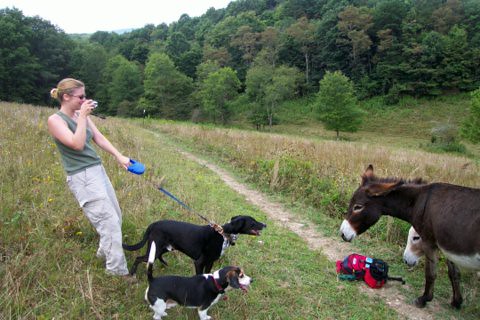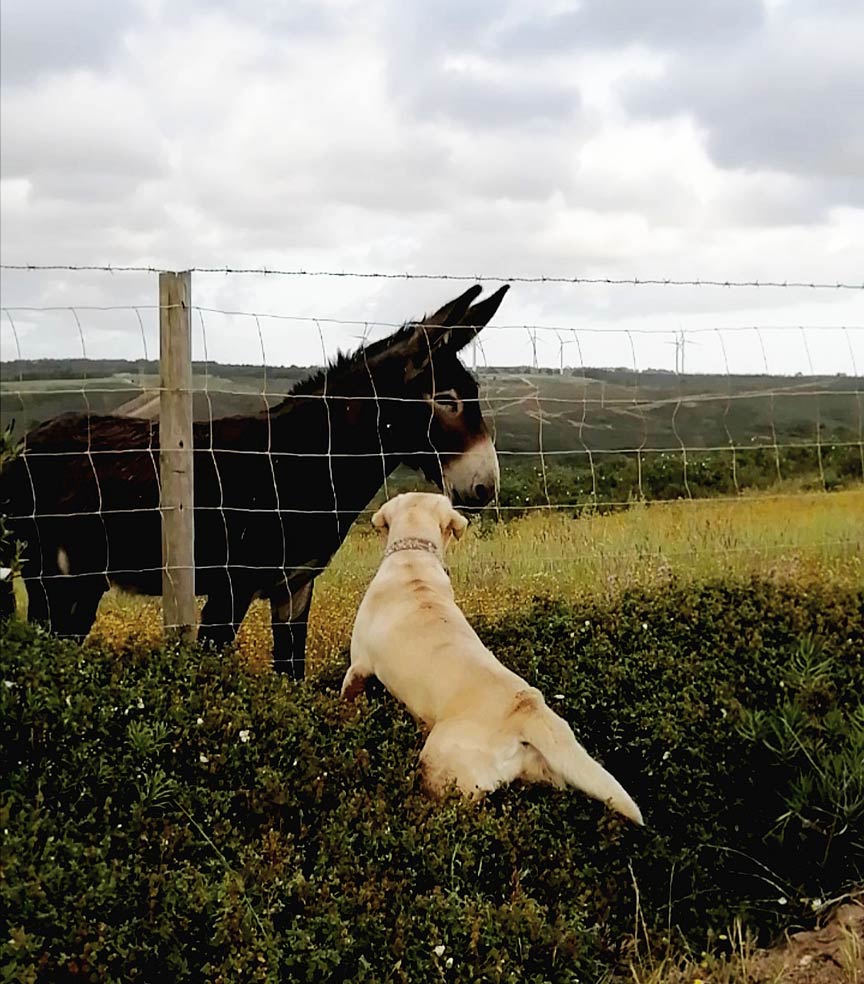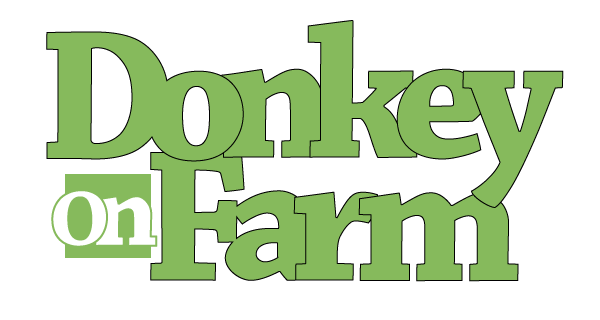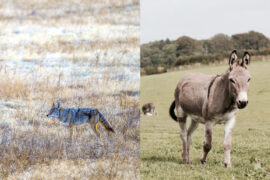Donkeys are strong animals who have quite a powerful kick when they want to use it. Unprovoked, donkeys are usually peaceful animals, but they will absolutely defend themselves and their herd if they feel the need to. In answer to the question, “Are donkeys dangerous to dogs?” The answer is that yes, they can be.
Though donkeys are larger animals, they do still have some predators that they fear. These usually include but are not limited to animals like coyotes, wolves, cougars, mountain lions, and more. It is easy to consider how a donkey might find a rambunctious or loud dog to be a threat, even if you know that the dog would never hurt the donkey.
A rowdy or rambunctious dog can lead to the donkey attacking the dog with the self-defense tools at its disposal, which include biting, kicking, and stomping. These actions could clearly cause serious bodily harm to a dog. Now that we’ve discussed why and how donkeys are dangerous to dogs, let’s discuss how to keep both donkeys and dogs safe when they live on the same farm.
Are donkeys dangerous to dogs: how to keep a dog safe around a donkey?
There are a few things to think about when considering how to go about keeping a dog safe from a potential attack by a donkey. One of the first steps you must consider before allowing the animals to be out at the same time is fencing. Until you know how your donkey will behave around your dog or how your dog will behave around a donkey, you’ll want to ensure that they can’t get near each other.
If your dog can easily jump the fence and get to the donkey, the dog may need to be kept on a leash when outside until such time that you can determine how to deter the dog from jumping the fence or determine whether or not the donkey will harm the dog.

Training your dog to behave around donkeys
Training your dog to behave appropriately around donkeys will also be a key factor in ensuring a peaceful environment. This training can happen at any age, whether you are introducing a new puppy to life on the farm or you are bringing a new donkey into the fold. Some people have found that their animals have formed impenetrable bonds if introduced to each other at a young age. So, if you are up for the challenge of getting a young donkey and a new puppy at the same time, you may find that they become the best of friends.
If training a dog how to behave around a donkey, you’ll first want to focus on recall commands. These are vital to ensure the dog’s safety. If the donkey is ever acting aggressive towards the dog and the dog is off leash, you’ll need to be able to trust that the dog will come running as soon as you call.
You’ll also need to train your dog to walk calmly beside you when near the pasture and to not bark at or growl at the donkey. Never bring a dog that is barking around a donkey, as it will surely get kicked by the donkey.
Ensure that your dog is on its best behavior around your donkey. Most importantly, make sure that your dog isn’t acting aggressively by trying to chase the donkey or barking loudly, as the donkey could become frightened by this and either choose to flee or fight. Consider how your dog acts around other farm animals. Does your dog always give chase to the sheep? Does your dog bark at the chickens? Before introducing your dog and donkey, you’ll need to fix these behaviors with your dog first. Practice walking your dog on a leash and reward the dog with treats as you go when he doesn’t react to the other animals. Keeping his attention on you will help ensure that he isn’t overstimulated by all the other animals around.
How to introduce a donkey and a dog
If you’ve determined that your donkey and dog are fine as long as they are separated by a fence, your work may be done. However, if you ever wish to walk with your donkey or bring your dog into the pasture with you, you will need to introduce the dog and the donkey properly. As mentioned, the best way to do this is to start the introduction through a fence. The fence acts as a barrier and ensures the protection of both animals. If that goes well and they seem curious about each other, you could then try taking the dog on a leash and walking into the pasture when the donkey isn’t too close.
Small steps are going to be key in ensuring the safety of both animals and making sure that no one gets scared and reacts poorly. Then, if the donkey doesn’t seem concerned about the dog’s presence in the pasture, you can try bringing the dog a little closer to where the donkey is. Again, maintaining a calm environment and ensuring the dog remains calm is of the utmost importance. Watch your donkey’s body language as you and the dog get closer. If the donkey seems at all stressed, apprehensive, or angry, walk the dog back to where you came from. Pushing things too fast could cause the donkey to react poorly.

If they just don’t get along
In some cases, dogs and donkeys just might never get along. It really all is dependent on each animal’s past experiences and personalities. If a donkey had been traumatized at a young age by an aggressive dog, it will likely never allow a dog to come near it without seriously harming the dog. Similarly, if a dog loves to bark at and chase other animals or has a strong prey drive, it may never be able to be around a donkey. For the most part, these are both okay situations to have. Dogs and donkeys don’t necessarily need to be side by side to do their jobs or go about their days. In order to keep the peace and keep everyone safe, you may just need to keep them separated.
Conclusion
So, are donkeys dangerous to dogs? Yes, donkeys can easily be dangerous to dogs. They have powerful kicks and a strong bite. If threatened, they won’t hesitate to use the tools at their disposal to defend themselves. The good news, though, is that with some patience, you can usually teach your dog not to provoke the donkey and the donkey to accept the dog.

![Are Donkeys Dangerous to Dogs? [Plus How to Keep Your Dog Safe] Are-Donkeys-Dangerous-to-Dogs](https://donkeyonfarm.com/wp-content/uploads/2022/07/Are-Donkeys-Dangerous-to-Dogs.jpg)

![How Cold is Too Cold for a Donkey? [Plus Tips to Keep Them Warm] How-Cold-is-Too-Cold-for-a-Donkey](https://donkeyonfarm.com/wp-content/uploads/2022/09/How-Cold-is-Too-Cold-for-a-Donkey-270x180.jpg)
![Do Donkeys Laugh? [Plus Why Do They Do It?] do-donkeys-laugh](https://donkeyonfarm.com/wp-content/uploads/2022/08/Why-do-donkeys-laugh-270x180.jpg)
![How to Get Rid of Flies on Your Donkey? [Plus Prevention Methods] How to Get Rid of Flies on your Donkey](https://donkeyonfarm.com/wp-content/uploads/2022/05/How-to-Get-Rid-of-Flies-on-your-Donkey-270x180.jpg)
